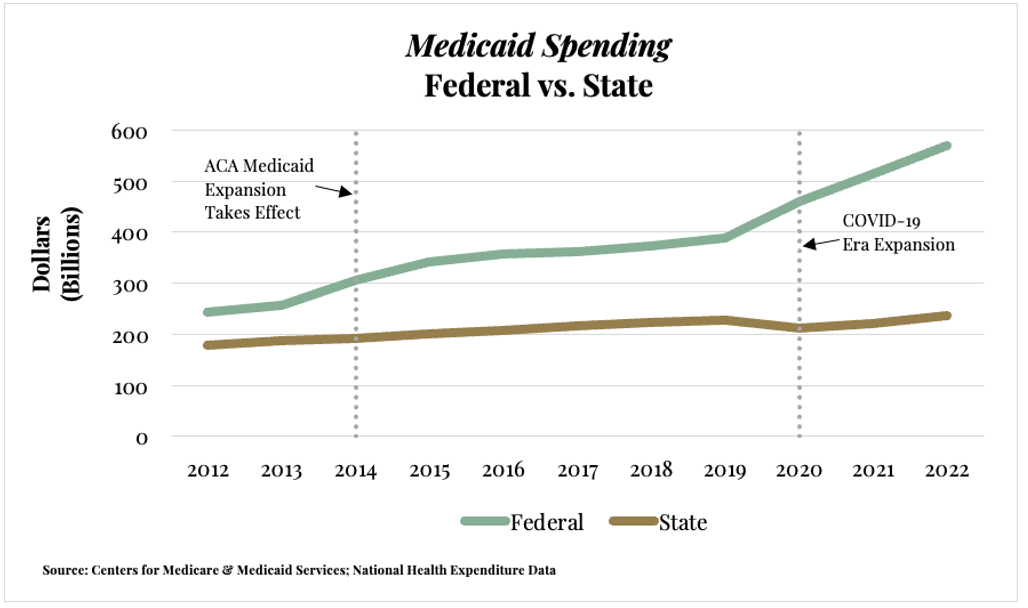Dear Governors: Just Say ‘No’ To Medicaid Expansion
Recently, Sally Pipes, President of the Pacific Research Institute, wrote a column sounding the alarm on the unintended consequences of Medicaid expansion. Pipes highlights how the radical Obamacare expansion of Medicaid to able-bodied adults has decreased access to quality care for more vulnerable enrollees, skyrocketed federal Medicaid spending, and increased improper and fraudulent payments.
Medicaid was originally designed as a safety net health program to provide vital care to the nation’s most vulnerable populations, including impoverished children, pregnant women, and the elderly, along with individuals with disabilities. Obamacare expanded the eligibility of the program to able-bodied adults without dependents and prioritized this expansion population over the most vulnerable groups by providing higher federal reimbursement for the expansion population.
Obamacare’s Medicaid expansion and COVID-19 pandemic era changes to the Medicaid program have also significantly increased the share of the program paid for by the federal government, driving up our national debt and forcing taxpayers to pick up the bill for misguided Washington policies.
Word on the Street Via Forbes:
- “States with per-capita income below the national average receive more than one dollar for each dollar they spend on Medicaid. By statute, the federal government can fund no more than 83% of a state's Medicaid program.”
- “To encourage states to expand Medicaid, Obamacare made the deal even sweeter. It promised to cover no less than 90% of the cost of Medicaid for the expansion population in perpetuity.”
- “Worst of all, Medicaid expansion encourages states to focus on the more profitable—but less impoverished—expansion population at the expense of the program's legacy enrollees. One study found that expansion has siphoned resources away from children, the disabled, and elderly Medicaid enrollees.”
- “To make matters worse, Medicaid expansion often leaves enrollees with worse coverage than they previously had. According to Blase and Gonshorowski, 65% of Floridians who would gain Medicaid coverage would be giving up "private coverage, which offers better access to both primary and specialty care appointments."
- “Medicaid beneficiaries often struggle to put their coverage to use. Because of the program's low reimbursement rates, doctors tend to limit the number of Medicaid patients they'll see. That leads to waits for care—waits that worsen when a surge of new able-bodied enrollees gain coverage.”
- “There's a final reason states are right to say "no" to Medicaid expansion—fraud. Improper payments by the program climbed from $36 billion in 2018 to $80 billion in 2022, thanks in large part to a COVID-era suspension of eligibility reviews. Federal taxpayers spent billions on coverage for people who aren't legally entitled to it. Expansion makes such fraud more likely.”
- “Agreeing to Medicaid expansion means agreeing to a wasteful, expensive program that fails to deliver for patients.”
The Bottom Line:
Increased enrollment in Medicaid, largely a result of Obamacare’s Medicaid expansion, is significantly increasing federal health spending, which is a key driver of our staggering $34 trillion national debt.
In fact, according to the nonpartisan Congressional Budget Office (CBO), in 2022, federal spending on Medicaid was $592 billion, a shocking 45% increase from 2019 spending levels and a 123% increase from 2013 spending levels of $265 billion.
While federal spending on Medicaid has skyrocketed in recent years, state spending has not kept pace, resulting in a larger amount of the burden to fund Medicaid falling on federal taxpayers and contributing to our out-of-control national debt.

In addition to increased federal spending, the expansion of Medicaid and the prioritization of able-bodied adults over vulnerable populations has also worsened patient access to quality care and has led to skyrocketing rates of improper and fraudulent payments.
The prioritization of able-bodied adults over populations who need Medicaid the most, including disabled children, is wrong and threatens the future of the Medicaid program. House Budget Committee Republicans are committed to strengthening the Medicaid program for future generations of Americans by refocusing the program on the most vulnerable.
The House Budget Committee’s Fiscal Year 2024 “Reverse the Curse” Budget Resolution included reforms to put Medicaid on a sustainable path through common sense policies that protect the program for the Americans who need it most, while also decreasing federal spending and restoring fiscal sanity to our country.


